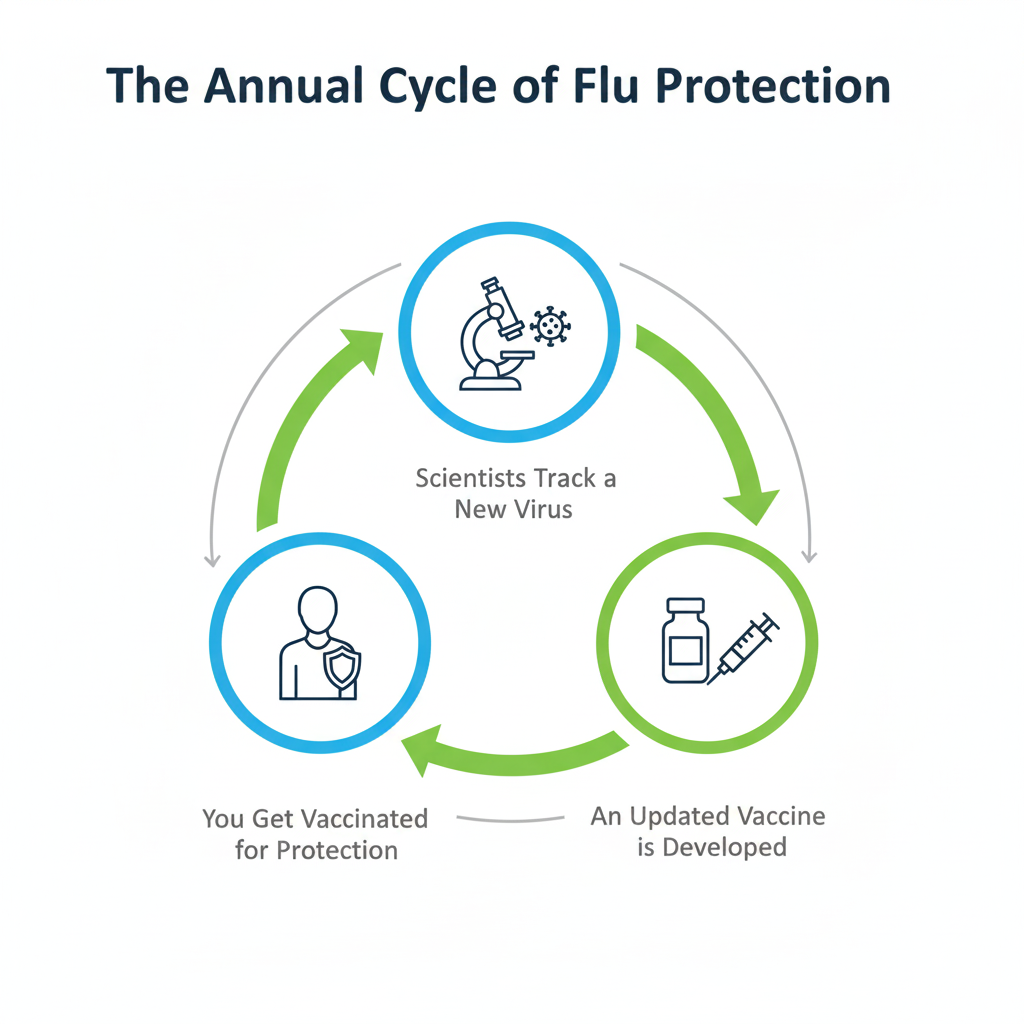Cold weather is coming. Flu season is near. Many people start talking about getting vaccinated. You might wonder why the yearly flu shot matters so much. Millions of people around the world get flu shots each year. This helps them stay healthy and protects their families too.At DrMorepenHome, we want to keep everyone healthy. We believe flu shots help prevent sickness. Getting the right information is important for making good choices about your health.
What Is the Annual Flu Shot?
The yearly flu shot is a vaccine that fights the flu virus. When you get the shot, your body learns to fight off flu germs. The flu virus changes every year, so you need a new shot each year to stay protected.
Scientists make new flu vaccines each year. They try to guess which flu germs will spread the most. This is why you need to get vaccinated every year.
%2520(1).png)
Who Should Get It?
The CDC says almost everyone 6 months old and up should get a flu shot. Some people can't get it because of health problems, but most people should get vaccinated.
Why Get a New Shot Every Year?
The flu is not just a bad cold. It can make you very sick. Some people end up in the hospital. Others might even die from flu complications. Young children, old people, pregnant women, and people with health problems are at highest risk.
The flu virus keeps changing. Each year brings new types of flu germs. This is why doctors update the vaccine every year. Scientists watch flu activity around the world to make the best vaccine possible.
Common problems from flu:
- Lung infection (pneumonia)
- Breathing problems (bronchitis)
- Sinus and ear infections
How Flu Shots Help Everyone
Getting your flu shot protects more than just you. It helps keep your whole community healthy. When lots of people get vaccinated, the flu spreads less. This helps protect people who can't get shots because of medical reasons.
Fewer people get sick when more people are vaccinated. Hospitals see fewer flu patients. Schools and workplaces stay healthier too.
Main Benefits of Flu Vaccination
Less Severe Sickness
The flu shot greatly lowers your chances of getting very sick from the flu. Even if you still catch the flu after getting vaccinated, you'll likely feel less sick and get better faster.

Good news: Studies show that flu vaccination cuts doctor visits for flu by 40% to 60%.
Fewer Hospital Stays
Hospitals get crowded during flu season. Many people need emergency care. Getting your annual flu shot helps reduce this problem by keeping people out of the hospital.
This protection works for all ages. Children, seniors, and people with ongoing health problems all benefit from fewer hospital visits.
"Flu vaccinations prevent tens of thousands of flu-related hospitalizations each year," says a health expert at DrMorepenHome.
Money and Society Benefits
The flu shot saves money in ways you might not think about. When fewer people get sick, fewer people miss work or school. This keeps businesses running and kids learning.
Benefits include:
- Fewer doctor visits
- Less need for medicine
- Fewer ambulance calls
How Well Do Flu Shots Work?
How Vaccines Protect You
The flu vaccine trains your immune system. The shot contains dead or weak flu virus pieces. These can't make you sick, but they teach your body to recognize real flu germs. If you're exposed to the flu later, your body knows how to fight it.

What Affects How Well It Works
The flu virus changes quickly. Sometimes the vaccine matches the spreading germs perfectly. Other times, the match isn't as good. Your age and health also matter for how well the vaccine works.
Even when the match isn't perfect, you still get some protection. This is better than no protection at all.
Why Updates Matter Each Year
Health experts review and update flu vaccines every year. They study flu activity worldwide to make the best vaccine possible. This ongoing work is why you need a new shot each year.
By tracking flu patterns globally, scientists try to match vaccines to the germs most likely to spread.
Common Myths About Flu Shots

Are Flu Shots Safe?
Many people worry that flu shots aren't safe. This worry is not based on facts. Flu vaccines go through careful testing before people can get them. The FDA watches how vaccines are made to make sure they're safe.
Most side effects are mild and don't last long. Soreness where you got the shot is normal. A low fever might happen too. These signs show your body is building protection.
Common Side Effects
Rare Side Effects
Sore arm where you got the shot
Severe allergic reactions (very rare)
Low fever
Guillain-Barré syndrome (extremely rare)
Mild headache
Can the Flu Shot Give You the Flu?
No, the flu shot cannot give you the flu. The vaccine is made with dead flu viruses or just one gene from the flu virus. Neither can make you sick with the flu.You might feel mild symptoms like a slight fever or sore muscles after getting vaccinated. These feelings show that your body is responding to the vaccine correctly.
Dealing with Worries and False Information
If you're worried about vaccines, talk to your doctor. Get information from trusted sources like healthcare providers, the CDC, and WHO. DrMorepenHome shares reliable health information to help people make good choices.
Some people think getting sick naturally is better than getting vaccinated. This thinking ignores the real dangers of getting very sick from the flu. Vaccines are a safer way to build protection.
.png)
Preventing Flu Outbreaks
How Vaccines Stop Outbreaks
Vaccination is key to stopping flu outbreaks. When fewer people can catch and spread the flu, outbreaks become less likely. High vaccination rates create barriers that protect everyone - even people who can't get vaccinated.
Community Protection Benefits
Community immunity is very valuable for public health. It protects people who can't get vaccines, like babies under 6 months old and people with weak immune systems.
When most people in a community are protected, disease spreads much less. This shows how individual health choices affect everyone's health.
Vaccines in Public Health Plans
Vaccines are central to public health strategies worldwide. Health agencies coordinate vaccination programs through seasonal flu campaigns. These programs help reduce disease impact on society.
Healthcare providers, public health groups, and communities must work together. Organizations like DrMorepenHome make sure flu vaccination is easy to get and that people have good health information.
Ways we help:
- Convenient vaccine clinics
- Health education programs
- Working with local health authorities
By focusing on these areas, public health officials can reduce flu epidemic impacts. This forward-thinking approach is crucial for keeping society healthy and improving health security globally.
Conclusion
The annual flu shot is much more than protection against seasonal sickness. It guards public health and offers important defense to individuals and whole communities. The flu might seem like a normal part of changing seasons, but it can seriously disrupt lives and overwhelm hospitals.
DrMorepenHome believes that informed health choices are empowered health choices. Understanding how flu vaccines work - from preventing severe cases to reducing economic impact and creating community immunity - helps each of us make confident decisions about our health.
We hope this information encourages you to take active steps in caring for your health and the wellbeing of people around you. When more people choose annual vaccination, our shared strength against the flu grows. Let's make flu season a time when health wins.
Frequently Asked Questions About Flu Vaccination
Who Should Get the Annual Flu Shot?
The CDC recommends that everyone 6 months and older get an annual flu vaccine. It's especially important for people at high risk: young children, elderly adults, people with ongoing medical conditions, and pregnant women.
When Is the Best Time to Get Vaccinated?
Try to get your flu shot by the end of October. This timing gives you the best protection before flu season peaks. Getting vaccinated later in the season still helps prevent infection and reduce severity.
Are There Side Effects?
Most people have few side effects from flu vaccination. A sore arm where you got the shot is most common. Sometimes people feel mild fever or muscle aches that go away in a day or two. Serious reactions are rare, but talk to your healthcare provider about any concerns.
Will the Flu Shot Give You the Flu?
No, the flu shot cannot cause the flu. The vaccine contains dead or weakened virus pieces that cannot cause illness. This type of vaccine helps your immune system prepare to fight real infection without making you sick.
Can Pregnant Women Safely Get a Flu Shot?
Yes, flu vaccination is recommended and safe for pregnant women at any stage of pregnancy. Getting vaccinated during pregnancy protects the mother and gives some immunity to the baby during the first few months of life, when babies are most vulnerable to flu complications.
With this knowledge, consider promoting flu awareness at your workplace, schools, and with family. Individual actions add up to create a healthier, stronger community.
.png)



.png)
.png)
.png)
.png)
.png)
.png)
.png)

.png)
.png)
.png)

.png)
.png)
.png)
.png)
.png)
.png)

.png)
.png)

.png)
.png)
.png)

.png)

.png)


.png)







